- Home
- Margaret Brownley
Left at the Altar
Left at the Altar Read online
Thank you for purchasing this eBook.
At Sourcebooks we believe one thing:
BOOKS CHANGE LIVES.
We would love to invite you to receive exclusive rewards. Sign up now for VIP savings, bonus content, early access to new ideas we’re developing, and sneak peeks at our hottest titles!
Happy reading!
SIGN UP NOW!
Copyright © 2016 by Margaret Brownley
Cover and internal design © 2016 by Sourcebooks, Inc.
Cover art by Gregg Gulbronson
Sourcebooks and the colophon are registered trademarks of Sourcebooks, Inc.
All rights reserved. No part of this book may be reproduced in any form or by any electronic or mechanical means including information storage and retrieval systems—except in the case of brief quotations embodied in critical articles or reviews—without permission in writing from its publisher, Sourcebooks, Inc.
The characters and events portrayed in this book are fictitious or are used fictitiously. Any similarity to real persons, living or dead, is purely coincidental and not intended by the author.
Published by Sourcebooks Casablanca, an imprint of Sourcebooks, Inc.
P.O. Box 4410, Naperville, Illinois 60567-4410
(630) 961-3900
Fax: (630) 961-2168
www.sourcebooks.com
Contents
Front Cover
Title Page
Copyright
One
Two
Three
Four
Five
Six
Seven
Eight
Nine
Ten
Eleven
Twelve
Thirteen
Fourteen
Fifteen
Sixteen
Seventeen
Eighteen
Nineteen
Twenty
Twenty-one
Twenty-two
Twenty-three
Twenty-four
Twenty-five
Twenty-six
Twenty-seven
Twenty-eight
Twenty-nine
Thirty
Thirty-one
Thirty-two
Thirty-three
Thirty-four
Thirty-five
Thirty-six
Thirty-seven
Thirty-eight
Epilogue
Author’s Note
An Excerpt from To Win a Sheriff’s Heart
One
Two
Three
An Excerpt from The Last Chance Cowboys: The Lawman
One
Acknowledgments
About the Author
Back Cover
For George, till we meet again
“Time does not change us. It just unfolds us.”
—Max Frisch
One
Two-Time, Texas
1880
“Fifty-four minutes.”
Her father’s booming voice made Meg Lockwood want to scream. But airing her lungs in church wasn’t an option, and thanks to the whalebone corset beneath her wedding gown, neither was breathing.
“Mama, make him stop.”
Her mother straightened the garland of daisies in Meg’s hair for perhaps the hundredth time so far that day before turning to her husband. “Henry, must you?”
Papa kept his gaze glued to his gold pocket watch rather than answer, his wagging finger ready to drop the instant the minute hand moved. Not by any means a formal man, he’d battled with Mama over his wedding attire until, like a defeated general, he’d thrown up his arms in surrender. Unfortunately, the knee-length coat Mama had chosen emphasized Papa’s ungainly shape, which bore a striking resemblance to a pickle barrel.
The finger came down. “He is now fifty-five minutes late.”
Meg’s hands curled around the satin fabric of her skirt. Where was her bridegroom? She hated to keep the wedding guests waiting, but she didn’t know what to do. Time meant nothing to her erstwhile fiancé, but he’d promised not to be late for their wedding. She’d trusted him to keep his word.
Just you wait, Tommy Farrell!
When he finally did show up, she wouldn’t be responsible for her actions.
Tommy wasn’t the only reason for her ill temper. As if her too-tight corset wasn’t bad enough, the ruffled lace at her neck made her skin itch, and the butterfly bustle hung like a brick at the small of her back. Worse, the torture chambers disguised as dainty white slippers were killing her feet.
The church organ in the nearby sanctuary moaned louder, as if even the organist’s patience was spent. The somber chords now rattled the walls of the tiny anteroom, threatening the framed picture and forcing the glass beads on the kerosene lamp to jiggle in protest.
She met her mother’s worried gaze in the beveled-glass mirror. At forty-five, Elizabeth Lockwood still moved with the ease and grace of a woman half her age. The green velvet gown showed off her still-tiny waist and slim hips.
A wistful look smoothed the lines of worry on her mother’s face. “You look beautiful.”
Meg forced a smile. “So do you, Mama.”
Meg had inherited her mother’s honey-blond hair, turquoise eyes, and dainty features, but her restless countenance was clearly thanks to her father’s side.
“Fifty-six minutes late,” her father exclaimed, and Meg’s already taut nerves threatened to snap.
Clenching her hands tightly, she spun around to face him. “You never change!”
“Change? Change!” Papa looked indignant as a self-righteous preacher. “Why would I? Someone has to maintain a healthy respect for time.”
The door swung open. Thank goodness. Meg whirled about again, ready to give her errant fiancé a piece of her mind, but it was only her older sister. The worried frown on Josie’s face told Meg everything she needed to know, but still she had to ask.
“Anything?”
Josie shook her head. At twenty-three, she was two years older than Meg, and at five foot ten, stood a good six inches taller. Today she wore a dusky-rose gown that complemented her dark hair and gave her complexion a pretty pink glow. She took after Papa’s side in looks, but of the three Lockwood girls, she was most like Mama in calm disposition.
“Ralph looked all over town.” Ralph Johnson was Josie’s husband, and he owned the saddle shop at the end of Two-Time’s main street. “You don’t suppose something might have happened to Tommy, do you? An accident?”
“It better have,” Meg muttered.
Gasping, Mama looked up from straightening Meg’s gown. “Of all the things to say!”
“Sorry, Mama.” Hands balled at her sides, Meg gritted her teeth. Her mother was right, of course; such uncharitable thoughts didn’t belong in church.
Neither did thoughts of murder.
“Fifty-eight minutes,” her father announced.
“I’m sure he’ll be here soon, Papa.” Josie always tried to see the bright side of things, but even she couldn’t hide the doubt in her voice.
Papa’s gaze remained on his watch. “Soon’s already come and gone. Now he’ll have to answer to me for keeping my daughter waiting!”
Her father didn’t fool Meg one whit—he’d been against the marriage from the start. If she didn’t know better, she would suspect him of causing her fiancé’s absence just to prove he was right.
“Fifty-nine minutes!”
“Henry, please,” her mother cajoled. “You’re upsetting her.”
“She should be upset. The boy’s irresponsible and will never amount to a hill of beans. He’s like a blister; he never shows up till the work’s all done. Doesn’t even know whether to wind his watch or bark at the
moon. I should never have agreed to this marriage.”
“You didn’t agree to anything, Henry.”
“And for good reason! Furthermore—”
A knock sounded, but before anyone could answer it, the door cracked open and Reverend Wellmaker popped his head into the room. “Is everything all right?” he asked, eyes round behind his spectacles. “We’re almost twenty minutes late.”
“Fifty-nine minutes late!” her father roared.
The difference in times raised no eyebrows, since no standard time existed in Two-Time. It was common practice for communities to set watches by the local jeweler, but unfortunately, their town had two—Meg’s father and Tommy’s pa. Both stubbornly insisted they alone had the right time.
The feud dividing the town for more than fifteen years was expected to end the minute the two families were joined by marriage. Both fathers had agreed—albeit reluctantly—to standardize time once the deed was done.
“Shh, Henry, not here.” Her mother gave the minister an apologetic smile. “Soon.”
Josie left with the pastor, and Papa continued his sonorous count until interrupted by another knock on the door.
“Meg, it’s me, Tommy.”
“It’s about time!” She hiked her skirt above her ankles and started across the room.
Her mother grabbed her by the arm. “It’s bad luck for the groom to see you in your wedding gown,” she whispered.
“It’s worse luck for the groom to be an hour late for his own wedding.” Meg pulled free from her mother’s grasp and ripped open the door. “Where have you been? You agreed to get married on Lockwood time and—” Suddenly aware that something was terribly wrong, she bit back the rest of her sentence.
Tommy looked as sober as an owl in a barn. Even more worrisome was his attire—old canvas trousers held up by blue suspenders. He appeared haggard, as if he hadn’t slept, and his unruly red hair stood on end like a rooster’s comb.
“We have to talk.” He grabbed her by the hand and pulled her out of the room and down the hall.
She held back. “Thomas James Farrell, stop right now. You hear me? I said stop!”
But he didn’t stop, not until they reached the cemetery behind the church. It took a moment for Meg’s eyes to adjust to the bright autumn sun.
Tall, granite grave markers stood at attention like pieces on a chessboard waiting for someone to make the first move.
She snatched her hand from his. “What do you think you’re doing? What’s going on?”
Tommy grimaced. “Meg, I’m sorry, but I can’t do this. I can’t marry you.”
She stared at him, dumbfounded. This can’t be happening. “What are you saying?”
“I’m sayin’ I can’t be the husband you want. I can’t spend the rest of my life workin’ on watches in my father’s shop. All those hairsprings and gears and stems and—”
“This is how you give me the news?” She gave him an angry shove. “Tommy Farrell, I’ve known you nearly all my life, and you’ve caused me plenty of grief along the way, but this takes the cake!”
“I’m sorry.” He slapped his hand to his forehead. “I’m goin’ about this all wrong. It’s not that I don’t want to marry you. I just can’t.”
“And you waited for our wedding day to tell me this?”
“I feel bad, I do.”
“You feel bad? How do you suppose our guests feel after being kept waiting all this time? And what about the town? Our fathers promised to end their feud—”
“I know, I know.” He grimaced. “Right now, I’m only thinkin’ of you.”
“By humiliating me in front of the entire world?” She stared at him as if seeing him for the first time. For years, she’d made excuses for his lackadaisical ways and had even defended him to his own father. She’d forgiven him for forgetting her birthday—not once but twice! But this…this was by far the worst thing he’d ever done.
“I’d make you miserable,” he continued, his Texas twang even more pronounced than usual. “I’m not ready to settle down. I want to see the world. To travel to Europe and Asia and…and the Pacific Islands. I read somewhere that they’re real nice.”
“You’ve said some mighty dumb things in your life, but this has got to be the dumbest.”
“I knew you wouldn’t understand.”
“No, I don’t understand,” she cried. “I don’t understand how you could wait till today to throw me over for a bunch of islands!” She backed away from him, fists at her side. “I should have listened to Pa.”
“Meg, don’t look at me like that. It really is for the best. Maybe in a year, or two or three, I’ll be ready to marry and settle down. Maybe then we can—”
“Don’t you dare say it, Tommy Farrell. Don’t you even think it! I’d sooner die a spinster than marry the likes of you.”
“You don’t mean that…”
“I mean every word. I don’t ever want to see you again. Not ever!”
“Meg, please.”
“Just…just go!”
He stared at her as if making certain she wouldn’t change her mind. Then he swung around and rushed along the narrow dirt path leading out of the cemetery as if he couldn’t escape fast enough.
Watching him flee, Meg felt numb. Today was supposed to be the happiest day of her life, but instead, it had turned into a nightmare. How would she break the news to her family? To the guests? To the folks counting on this marriage to bring peace to the town? She pulled the garland from her hair, threw it on the ground, and stomped on it.
A movement caught her eye, and a tall figure stepped from behind an equally tall grave marker. Her gaze froze on the man’s long, lean form. A look of sympathy—or maybe even pity—had settled on his square-jawed face, crushing any hope that the humiliating scene had somehow escaped his notice. Her cheeks flared with heat. Could this day possibly get any worse?
He pulled off his derby and nodded at her as if apologizing for his presence.
“Sorry, ma’am. Forgive me. I couldn’t help but overhear.” If his dark trousers, coat, and vest hadn’t already marked him as an easterner, the way he pronounced his words surely did.
In no mood to forgive a man—any man, even one as tall and good-looking as this one—she grabbed a handful of satin, turned, and rushed to the church’s open door, snagging her wedding gown on the doorframe. She glanced over her shoulder to find him still watching her. In her haste to escape, she yanked at her skirt, and it ripped. The tearing sound might as well have been her heart.
Inside, the thundering organ music rang like a death knell. Hands over her ears, she kicked off her murderous slippers and ran down the hall in stocking feet.
Two
Grant Garrison left his boardinghouse and rode his mount down Peaceful Lane. Two-story brick residences lined the street, the boardinghouse where he lodged among them. Either the street name was a misnomer or someone had once had a strange sense of humor, because the street was anything but peaceful.
Even now, angry voices filled the morning air, the loudest coming from Mr. Crawford, who took regular issue with his next-door neighbor’s bagpipes. But he wasn’t the only one airing his lungs.
Mr. Sloan was yelling at the Johnson boy for stealing his pecans; Mrs. Conrad could be heard expressing her disapproval at the goat eating her flowers. Next door to her, Mr. Quincy was arguing with the paperboy, who had thrown the morning newspaper on the roof for the second time that week.
Grant tipped his hat to the two women gossiping over a fence and steered his horse around the wagon belonging to the dogcatcher. A terrible commotion drew Grant’s attention to an alleyway, and the dogcatcher emerged running, chased by a big yellow hound.
A half block away, the widow Rockwell walked out of her tiny house carrying a lamp. Compared to the other buildings on the street, the two tiny residences she owned looked like dollhouses. She waved at Grant, and he tipped his hat in greeting.
“Need any help?” he called. He’d already helped her move
twice that week.
“No, not today.”
The widow’s two houses were located directly across from each other. Almost identical in size and style, they were called Sunday houses and had originally been built so that immigrant farmers could stay in town during weekends to run errands and attend church.
The problem was, the widow could never make up her mind which one to live in. No sooner would she haul her belongings to one side of the street than she decided to live on the other. So back and forth she traipsed from house to house, moving, always moving.
It had rained the night before, and puddles of mud dotted the dirt-packed road, causing the widow to pick her way across the street with care.
Except for a few lingering clouds, the sky was clear, and the air smelled fresh with just a hint of fall.
It was a normal day on Peaceful Lane—except for one thing. In the middle of the roadway, a woman was fighting with a pushcart.
Grant reined in his horse and narrowed his eyes against the bright morning sun. Did he know her? He didn’t think so. Still, something about her small, trim frame struck a familiar chord.
The lady pushed the cart one way and jerked it the other. A trunk or chest of some kind was perched precariously on top of the hand wagon, and it teetered back and forth like a child’s seesaw.
Apparently seeing the futility of her efforts, she leaned over to examine one of the wheels stuck in the mud. This afforded him an intriguing glimpse of a white lace petticoat beneath an otherwise somber blue dress. She surprised him by giving the pushcart a good kick with a well-aimed boot.
Hands folded on the pommel of his saddle, he leaned forward. “So what do you think, Chester? Should we offer to help before the lady does injury to her foot?”
For answer, his horse lowered his head and whickered.
“I quite agree.”
Urging his horse forward in a short gallop, Grant called, “May I be of service, ma’am?” He tugged on the reins. “Whoa, boy.”
She whirled around, eyes wide as she met his gaze. Two red spots stained her cheeks, but whether from exertion or embarrassment at being caught in a less-than-ladylike predicament, he couldn’t tell.
“Thank you kindly,” she said with a soft southern lilt.
“My pleasure.”
Her face looked vaguely familiar, but he still couldn’t place her, which struck him as odd. Her big turquoise eyes should not be easily forgotten. Hatless, she wore her honey-blond hair piled on top of her head, but a couple of soft ends had fallen loose. The carefree curls didn’t seem to belong to the stern, young face.

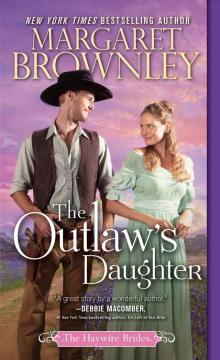 The Outlaw's Daughter
The Outlaw's Daughter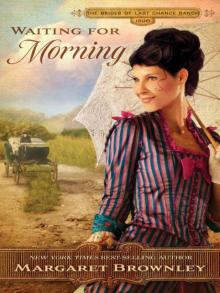 Waiting for Morning (The Brides Of Last Chance Ranch Series)
Waiting for Morning (The Brides Of Last Chance Ranch Series) Do You Hear What I Hear?
Do You Hear What I Hear?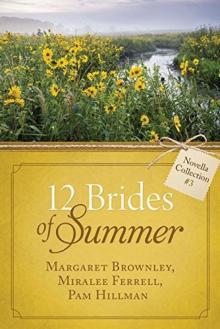 The 12 Brides of Summer Novella Collection #3
The 12 Brides of Summer Novella Collection #3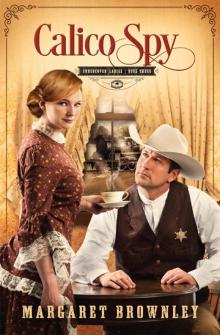 Calico Spy
Calico Spy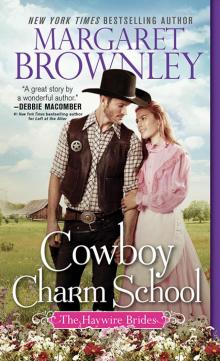 Cowboy Charm School
Cowboy Charm School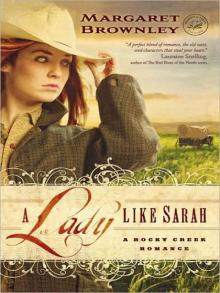 A Lady Like Sarah
A Lady Like Sarah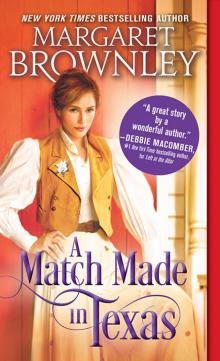 A Match Made in Texas
A Match Made in Texas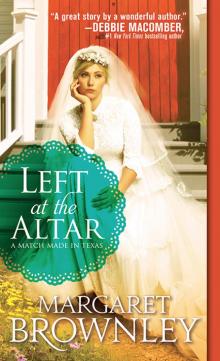 Left at the Altar
Left at the Altar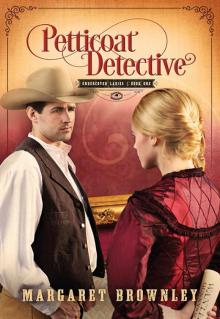 Petticoat Detective
Petticoat Detective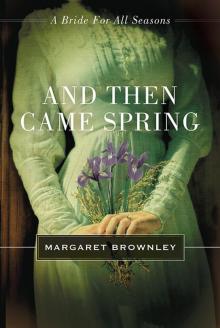 And Then Came Spring
And Then Came Spring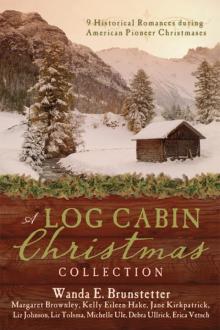 Log Cabin Christmas
Log Cabin Christmas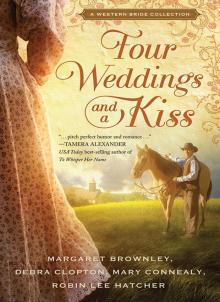 Four Weddings and a Kiss
Four Weddings and a Kiss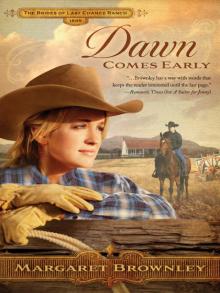 Dawn Comes Early
Dawn Comes Early